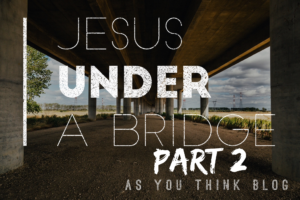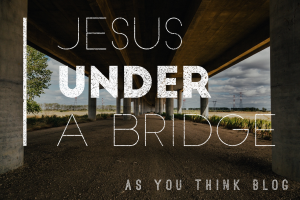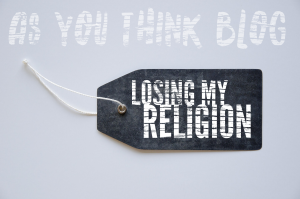 “People who fail deserve to be punished, including me.” This was a toxic thought that had been prevalent in my mind for many years. I had never recognized it for what it was – a lie. It was subtle. You see, those exact words never came out of my mouth, but they influenced so many decisions I made. Decisions to act or not act were made based on this thought. Why should I help somebody who deserves punishment? Besides, I was too busy punishing myself.
“People who fail deserve to be punished, including me.” This was a toxic thought that had been prevalent in my mind for many years. I had never recognized it for what it was – a lie. It was subtle. You see, those exact words never came out of my mouth, but they influenced so many decisions I made. Decisions to act or not act were made based on this thought. Why should I help somebody who deserves punishment? Besides, I was too busy punishing myself.
When I made the decision to begin this process of detoxing my thought life, I yielded my right to determine what thoughts needed to go and which ones should stay. I left that to the One who knew me before I ever took a breath. The One who knows all my thoughts. The One who knows me better than I know myself.
That morning He revealed this ugly thought to me, it was as if blinders came off of my eyes and I could see how this way of thinking had robbed me and others of so much love. If you know me, you may be thinking right now, “I don’t get it. I always thought you were a pretty nice guy.” I was, because you’re probably pretty nice too. But what about that segment of society that is not so lovable? You know, those undesirables living under the bridge? Or even the rich man who craves power so bad he’ll run over anybody to get it.
With the help of Holy Spirit, I had identified a toxic way of thinking that had held me back from a level of joy that I had only heard about. Now that it was exposed for what it was, there had to be a remedy. When you’re afflicted by an ailment of some kind, you look for a remedy, right?
Our gracious Father has the remedy for toxic thinking – it’s the truth found in His word.
There was a remedy for this toxic thought.
“In this is love, not that we loved God, but that He loved us and sent His Son to be the propitiation for our sins. Beloved, if God so loved us, we also ought to love one another.” (1 John 5:10-11)
What if God had looked at me the same way I looked at others I had deemed less than desirable? I don’t want to think about it.
For the next 21 days, with the scripture above in mind, I replaced “People who fail deserve to be punished, including me” with “Others and myself are the objects of His love.” Let those words wash over you for a minute or two. Utter those words about ten times in a row over yourself and tell me you don’t feel the presence of God!
It’s been well over a year since that morning of revelation and I’m finding that I can relate to this:
“Jesus went through all the towns and villages, teaching in their synagogues, preaching the good news of the kingdom and healing every disease and sickness. When He saw the crowds, He had compassion on them, because they were harassed and helpless, like sheep without a shepherd.” (Matt. 9:35-36 NIV)
He had compassion on them in spite of their awful condition. Without a doubt, some of these same folks would later yell “crucify Him!”
I want to love like that. I can. I will. I am the object of His love.
His beloved,
Kevin



